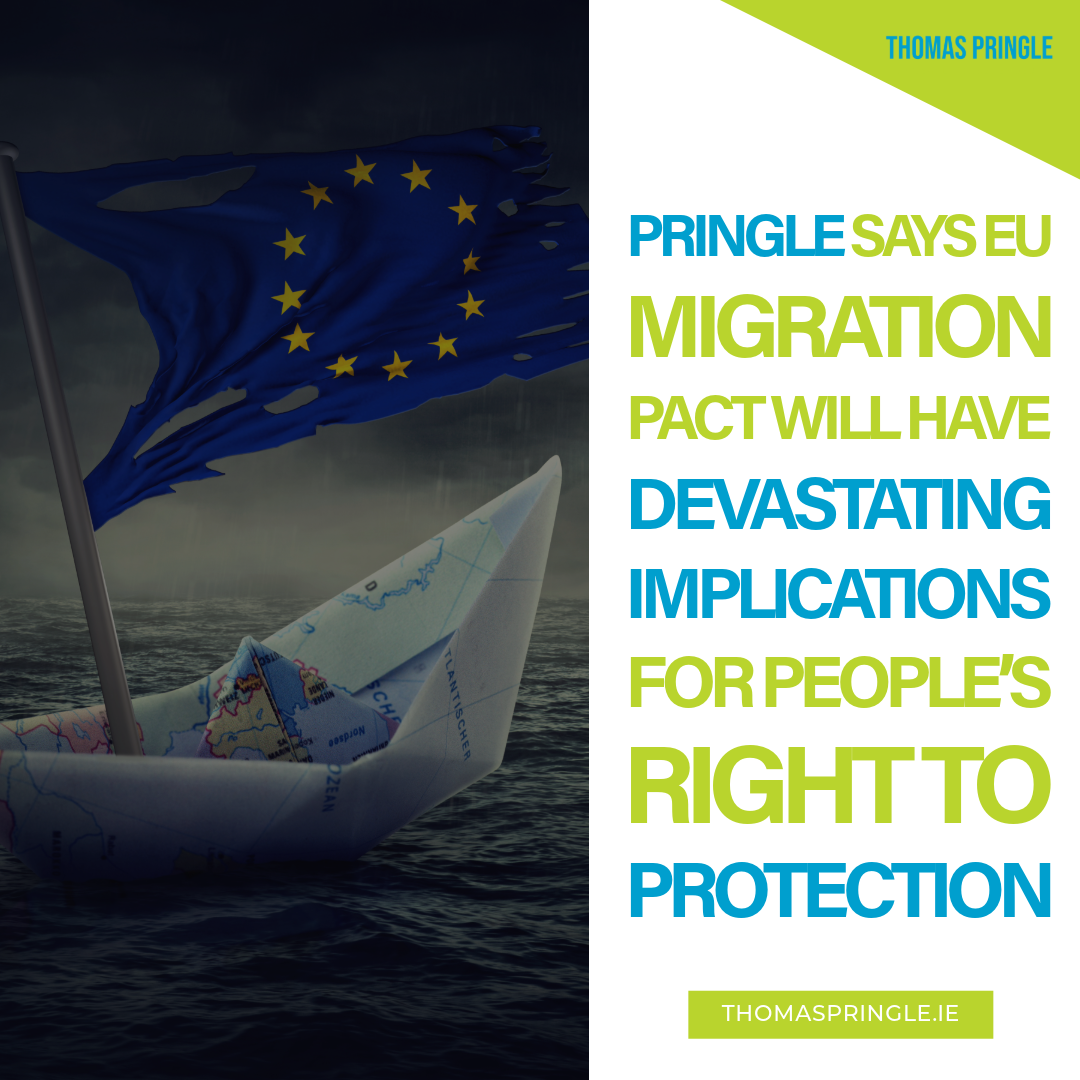- Pringle: We need a policy that recognises the importance of inshore fishing
- Pringle: Disabled people and carers face crisis of State neglect
- Pringle: Failed FF/FG housing policies forcing people to put their lives on hold
- Pringle welcomes Donegal council motion on Occupied Territories Bill: ‘We cannot stand by in the face of genocide’
Pringle says EU migration pact will have devastating implications for people’s right to protection
- Updated: 19th June 2024

Independent TD for Donegal, Thomas Pringle, said the EU migration pact will have devastating implications for people’s right to international protection and detrimental consequences for the rights and well-being of children seeking protection.
Addressing the Dáil on Tuesday, Deputy Pringle said: “It is heartbreaking to see people in this country use those who are in an extremely vulnerable position as a political talking point, as if stands regarding migration are merely a matter of opinion and not a matter of human rights and a matter of right and wrong.
“We cannot stand here and debate whether people have a right to live, a right to safety, a right to a life other than the one many have been so unfairly dealt. We can never know what it is like to wake up in a war-torn country, anxious and afraid, living day to day because you have no idea what your future looks like, where your next meal will come from or whether you and your family will see the day through.
“I know there has been much interest in this debate and potentially many people watching, and so I want to appeal to people’s humanity.
“I know there is much to be discussed and figured out when it comes to migration, and I agree that the government has handled this terribly in recent years. But we must not look past the human beings at the centre of this, or blame them in any way for the difficult and devastating lives that many have been forced to live.
“I understand that people feel angry and possibly protective, but we cannot let this feeling override logic or worse, our humanity. Many migrating to this country share the same fears as those who are wary of their arrival. They too are feeling fearful and protective of their families. This is what has driven them to leave in the first place.
“We all share the same emotions and the same fears. We too can share the same hopes and the same goals, but only if we allow it. Only if we don’t let fear and hate divide us,” he said.
The deputy was speaking against the Motion re Proposed approval by Dáil Éireann of the Regulations and a Directive of the European Parliament and of the Council on International Protection, Asylum and Migration.
Deputy Pringle said: “The pact will have devastating implications for people’s right to international protection. It will allow for human rights abuses across Europe, including racial profiling and de facto detention and I am particularly concerned about the pact’s expansion of biometric data gathering from migrants.”
“The pact goes too far in limiting the rights of those seeking protection. The choices of asylum seekers are already so limited and this pact threatens their basic human rights even further by introducing less safeguards, increased detention and destitution among people seeking protection.
“More than 160 organisations, including Amnesty International and Human Rights Watch, have expressed concern regarding this pact, which seeks to fingerprint children as young as seven,” he said.
The deputy said: “The profiling of minors, of seven-year-olds, should not be condoned in any way, never mind legislated for. This pact will have detrimental consequences for the rights and well-being of children seeking protection.”
The deputy said: “The EU should not be making it harder to seek protection when we are already offering so little. The EU’s share of the world’s refugee population has decreased from 70% in 1993 to under 20% since 2018. We are contributing less and less and getting increasingly stricter. On top of this we are also completely failing to address the root causes of migration. Europe has become so fixated on restricting migrants, that it fails to recognise or even attempt to address why migration is occurring in the first place,” he said.
Deputy Pringle said: “The EU has failed to address conflicts, persecutions and large-scale human rights violations and it has failed time and time again to respond to the adverse effects of climate change, natural disasters and other environmental issues, many of which Europe caused or contributed heavily to and now we’re going to adopt this. I think that is wrong.”



